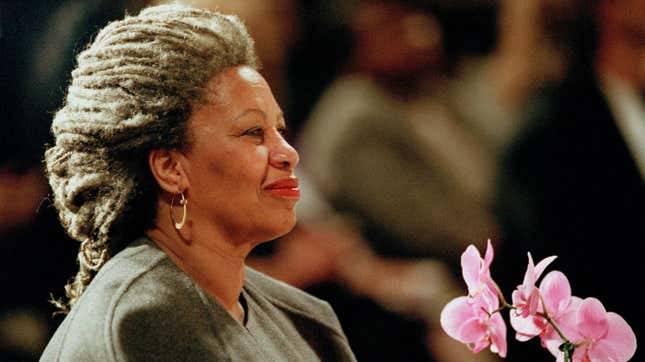Toni Morrison on Solidarity and the Labor of Writing Is Still Relevant Nearly 40 Years Later
Latest

The death of acclaimed author, Nobel Laureate, and Pulitzer Prize winner Toni Morrison has been met with an outpouring of reflections and tributes, each highlighting her incomparable contributions to literature and the black American experience. But as we rightly reflect on the singular nature of her work, it feels important to also remember her as she saw herself: a writer standing alongside other writers.
In 1981, Morrison gave a keynote speech at the American Writers Congress calling for solidarity among writers in the face of a grim landscape. “We live in an age of advanced capitalism, disintegrating into banditry,” Morrison said at the time. This age “tempts us into games devised by other people.” (The speech was recently referenced in a 2015 profile of Morrison in the New York Times magazine; the writer Haley Mlotek shared its full text with Jezebel after coming across it while doing research in the archives of the National Writers Union, a trade union for freelance and contract writers.)
Writing is often framed in the language of passion—it’s an obsession, a fixation, something almost supernatural—but never work. But this obscures the ways that writers are expected to endure an array of exploitative practices for a chance to make a living, and the general precarity of their labor.
Morrison spoke eloquently and forcefully to the exploitation that hides beneath the supposed glamour—and the danger of romanticizing the “individualism” of this work while glossing over the material realities that shape writers’ lives:
Romanticized and misapplied, individualism keeps us self-indulgent. It keeps us ignorant of contracts, of money, of benefits, of rights, of how the partnership between author and publisher ought to work, of the areas that threaten both publisher and writer. It keeps us in an adversary relationship at certain junctures where such a relationship is counterproductive. Individualism can also keep us dependent on foundation largesse, grants, fellowships, campuses, cloisters and handouts. And if things go on in this manner, individualism will idle us—it will keep us from the work we have to do. The political philosophy of the country chants its love of individualism, the nature of our work makes us prize it, the corporate compulsion of the industry fosters it. But it is not as individuals that we are abused and silenced; it is as writers.
While Morrison’s speech focused primarily on the publishing world, her words can just as easily speak to young writers today being coerced to trade their labor “for exposure,” or the writers and editor doing full-time work without salaries or benefits.
It’s easy for the lows to become normalized or turned into stories of deprivation that ultimately paid off. Morrison reminds us that these are lies (emphasis ours):
We need protection in the form of structure: an accessible organization that is truly representative of the diverse interests of all writers. An organization committed to the rights of the few. And we need protection in the form of clarity, a knowledge of the limits of individualism and the private, indulgent suffering it fosters. We have to stop loving our horror stories. Joyce’s Ulysses was rejected fourteen times. I don’t like that story; I hate it. Fitzgerald burned out and could not work. Hemingway despaired and could not work. A went mad, B died in penury, C drank herself to death, D was blacklisted, E committed suicide. I hate those stories. Great works are written in prisons and holding camps. So are stupid books. The misery does not validate the work. It outrages the sensibilities and violates the work.
Morrisson was a larger than life figure; her legacy is similarly towering. But she also saw herself standing alongside others, in solidarity and shared struggle. And she called others to stand alongside her: “We don’t need any more writers as solitary heroes,” Morrison said more than four decades ago. “We need a heroic writer’s movement: assertive, militant, pugnacious.”